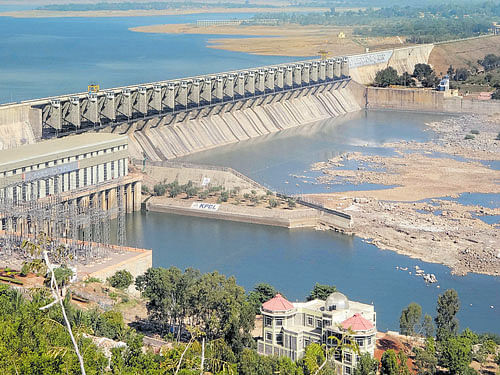
Water levels in Krishna and Cauvery reservoirs have hit record low threatening drinking water supply to Bengaluru and other parts of the state during summer.
Even if the State government were to ration the stored water, it will still fall short of the drinking water needs through the summer months.
When compared to last year’s storage, levels in these reservoirs have substantially reduced. The worst hit is Tungabhadra dam, which has a storage capacity of 100.86 TMC, but the available water at present is a mere 9.23 TMC. The corresponding figure for last year was 34.75 TMC.
The same bleak scenario prevails in the remaining reservoirs of Bhadra, Ghataprabha, Malaprabha, Almatti and Narayanpur.
According to Srinivas Reddy, Director, Karnataka State Natural Disaster Monitoring Centre (KSNDMC), never before has the situation been this grim in the Krishna basin.
“Though we have seen storage in KRS dam dipping below the dead storage level on previous occasions, reservoirs in the Krishna basin have never been in such a bad shape. Farmers have been alerted in both Krishna and Cauvery basins that there will be no water release for irrigation, this summer. Despite the austerity measure, meeting drinking water needs in rural areas will be difficult,” he said.
He noted that cities like Hubballi-Dharwad were getting water once in eight days, owing to the alarming low level in Malaprabha dam.
In KRS too, the present storage is only 18.69 TMC compared to last year’s 32.84 TMC. Even if the dead storage is around 2 TMC (water which cannot be utilised), another 2 TMC of water will be lost due to evaporation over the next five months, noted Reddy. Bengaluru alone requires 1.5 TMC water every month.
Deficient rainfall
North Interior Karnataka received 32 per cent deficient rainfall in the kharif season, owing to the failure of the southwest monsoon.
The State as a whole received 22 per cent deficient rainfall during the same period. In the rabi season too, North Interior Karnataka got 55 per cent deficient rainfall, while the figure for the entire state was 5 per cent deficiency.
Manjunath Naik, Commissioner, Rural Drinking Water department said that last week around Rs 17.81 crore was released to 58 taluks in 12 districts under Calamity Relief Fund, for various works like drilling/flushing of borewells.